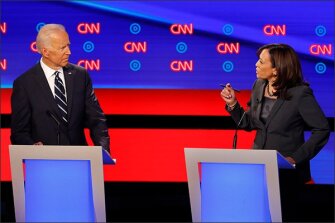
Former Vice President Joe Biden announced California Sen. Kamala Harris as his running mate Tuesday, completing the Democratic presidential ticket with a candidate who made waves in the primary when she challenged his record on school desegregation efforts.
Harris, the former attorney general of California, will be the first woman of color nominated for the vice presidency. The choice comes after months of protest demanding racial justice in policing and other sectors, including education.
Harris ran for president with an education plan that may dovetail with Biden’s in some key areas.
“You can judge a society by the way it treats its children, and one of the greatest expressions of love that a society can give to its children is educating those children with resources they need,” she said at her campaign rollout last year.
As a candidate, her first policy pitch was closing the “pay gap” between teachers and professionals in other fields with similar levels of education and experience. Under her plan, states would put up one dollar for every three they’d receive in federal dollars raising an average teacher’s base pay by about $13,500. Biden also frequently cites his plan for teacher raises, which is less concrete. He would triple Title I funding—federal grants used to educate students from low-income homes—and schools to use some of that funding to raise teacher compensation.
Biden’s choice won praise from leaders of national teachers unions, which both endorsed him.
“Simply put, the Biden-Harris ticket is the ‘Dream Team’ for our public schools and our students—one that respects educators and will listen to those who know the names of the kids in the classrooms when it comes to deciding what is best for our students,” National Education Association President Lily Eskelsen García said in a statement.
Like Biden, Harris proposed significantly increasing federal education spending through an unspecified boost to Title I, and a pledge to “fully fund” the Individuals with Disabilities Education Act.
She also proposed “incentives to states to conduct racial and resource equity audits, increase their public school spending, and adopt more equitable funding formulas.” She floated universal screenings for child trauma, expanding Head Start early childhood funding, and including schools in a federal infrastructure plan.
In addition, as California’s attorney general, Harris won a settlement from K12 Inc., a virtual charter school company, after launching an investigation into whether it inflated attendance numbers and misled parents.
At a moment of heightened scrutiny on the criminal justice system, some progressives have criticized Harris’ history as a prosecutor and attorney general. She’s faced pushback for a high-profile effort to punish the parents of chronically truant children as attorney general and as San Francisco’s district attorney.
By issuing parents warnings and citations, Harris said in a speech when she was running for attorney general, she could help them take the issue seriously. And schools could provide supports to help address the underlying issues that contribute to absences. She also championed a 2010 state law that introduced criminal penalties—including possible fines and jail time—for parents of chronically absent students.
In an interview with the liberal podcast Pod Save America last year, Harris expressed some regrets.
Sen. @KamalaHarris on the truancy law she championed as Attorney General that punishes parents if their kids miss too much school.
Full interview airs tonight: https://t.co/UJ9G9AzXdD pic.twitter.com/EOtCiKHXm7
— Pod Save America (@PodSaveAmerica) April 17, 2019
A Debate Over Desegregation

Before Tuesday’s announcement, Biden and Harris most notably interacted in a sharp exchange at a June 2019 debate in which she criticized his opposition to “busing” as a U.S. senator in the 1970s.
“You also worked ... to oppose busing,” Harris said, after calling out Biden for working too closely with segregationist senators early in his career. “And, you know, there was a little girl in California who was part of the second class to integrate her public schools, and she was bused to school every day. And that little girl was me.”
After Biden announced Harris as his choice, President Donald Trump tweeted out a negative ad that mentioned the exchange.
Biden was considered a strong opponent of busing early in his Senate career. He proposed several measures, including riders that restricted the use of federal funding to pay for transportation for desegregation purposes, and a bill that would have limited the Department of Justice’s ability to propose busing as a remedy to segregation.
While Harris made headlines for challenging Biden’s record on the subject, she struggled to articulate a clear difference between her and Biden’s current views on school desegregation in the weeks that followed. She later signed on as a co-sponsor of the Strength in Diversity Act, a Senate bill that would provide grants to districts that want to address racial and socioeconomic diversity, including those who want to use a transportation plan to do so.
Biden’s education plan calls for grants to encourage local desegregation efforts and the support of Obama-era civil rights guidance on voluntary integration.
Biden was recently photographed holding hand-written talking points about Harris that said he does not “hold grudges,” an apparent reference to that moment on the debate stage.
Back when Kamala was Attorney General, she worked closely with Beau. I watched as they took on the big banks, lifted up working people, and protected women and kids from abuse. I was proud then, and I’m proud now to have her as my partner in this campaign.
— Joe Biden (@JoeBiden) August 11, 2020
Top photo: Former Vice President Joe Biden shakes hands with Sen. Kamala Harris, D-Calif., before the second of two Democratic presidential primary debates hosted by CNN, July 31, 2019, in the Fox Theatre in Detroit. --Paul Sancya/AP
Bottom photo: Former Vice President Joe Biden listens as Sen. Kamala Harris, D-Calif., speaks during the second of two Democratic presidential primary debates hosted by CNN Wednesday, July 31, 2019, in the Fox Theatre in Detroit. --Paul Sancya/AP
